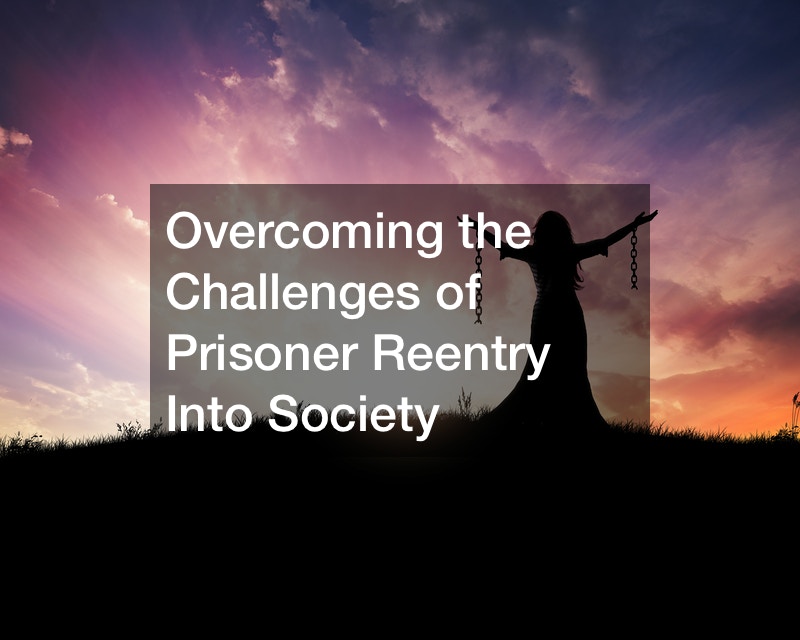
After the incarceration of your loved one, it is important to provide the care and support that will hasten the life transition out of prison. It is easier for one to feel lonely and unloved if the community is not supportive and encouraging. Understanding the challenges of prisoner reentry into society will also help create a rapport and a long-lasting relationship. With such a relationship, having a productive individual by your side becomes possible. These are the tips to help your loved one after prison.
Be Empathetic

After serving a term in prison, it is safe to say that your loved one paid for the crimes committed in the past. You should not hold grudges and other things against the individual. Instead, you should empathize with what they have gone through, especially if there was a show of remorse or regret for their past actions. When a loved one comes back home to a judgmental community, it will only lead to a life of seclusion, leading to other issues such as depression. When you empathize, you put yourself in the individual’s shoes, get to feel what they feel, and try to understand what they want.
A judgmental environment is among the challenges of prisoner reentry into society. It will take a while before your loved one adapts and starts being productive when there is less freedom and support from the people around. You should note that the situation your loved one experienced in prison took a big toll on their psychological state. In such a state, adapting to the outside world can prove hectic, especially without the right support and care. Being empathetic is vital as you can guide them through the different coping methods. Understanding the need to be empathetic will help you provide the right help to your loved one.
A show of care and support starts when you offer to pay a bail bond for your loved one and facilitate the incarceration process. This is among the first steps that will prove to the individual the care and concern you have for them. You should also note that the lens of empathy will also determine the reaction and response you will get from your loved one. Small gestures and show of support are all you need to help the individual adapt, settle, feel safe, and start being productive within a short time.
Start a Routine

Life after prison comes with a lot of uncertainties and confusion for the former inmates. Not knowing what to do can also lead to other psychological effects and mental health issues. It is essential to keep your loved one active by creating routines that are productive and influential. When there is a routine, their minds get occupied, and it becomes easier to forget what life in prison felt like. One of the challenges of prisoner reentry into society is finding a routine that keeps them busy and productive. It will be easier for your loved ones to have a smooth transition when they start a routine.
Effective exercising is one of the routines that you can engage your loved one and help transition smoothly to life outside prison. Exercise helps keep the body and the mind fit. Your loved one can concentrate on the best things life can offer when their mind and body are clean. If your loved one was abusing drugs before the sentence, starting a routine that involves effective exercises will help reduce the chances of engaging in them again. With a productive routine, adapting to the outside world and the many changes involved becomes easier in the long run.
To avoid the challenges of prisoner reentry into society, you should help your loved one set achievable goals. With many goals and expectations in mind, working towards achieving them becomes a good way of transition and becoming productive in the long run. This is also vital as you will reduce the effect of culture shock that most prisoners experience after incarceration. Setting a routine will come in handy in letting your loved one know the changes that occurred after years of being away and how best to cope with them. You should also create a routine that involves job hunting or engaging in activities that will help raise money and make it easier to start a new independent life faster.
Encourage Education

Depending on the offenses that led to your loved one spending years in prison, you must encourage education after incarceration. It’s likely that your loved one lost a job or their main source of income after years in prison. This also means that getting back in the community without any income-generating activity can lead to unexpected reactions. Lack of effective education that will allow easy transition is among the challenges of prisoner reentry into society and which you should handle with wisdom. You should address stamps and talk about going back to school as this is the best way to adapt to the community’s many changes.
It is essential to guide your loved one to focus on educational courses that are not technical and are hands-on. This is because the chances of getting a job are much higher and faster compared to pursuing white-collar jobs. It is easier to learn new skills and develop a profession as a roofer or an HVAC maintenance technician. This becomes vital as most owners and companies look for such services, and finding an income-generating activity as an expert becomes possible. Such services are also vital in hospital housekeeping and excavating companies, making it easier to secure a job and start a new and productive life after prison.
It is easier to solve the challenges of prisoner reentry into society when the focus is encouraging education. You can also link your loved one with different companies to try out and engage in internships to build relevant skills and experience that will make it possible to secure employment. You can also help them build and start a business, as this will help change their mindset and get around the thoughts of getting things for free. For instance, if you guide and help your loved one start a paving company, you will be creating a productive individual and a company that will come in handy in community projects. When you encourage education, you also encourage independence and effective transition into society.
Avoid Negative Influences
It is important to help your loved one see the essence of going to prison, serving a sentence, and getting rehabilitation. Accepting the wrongdoing and seeing the need for a change is essential and helps handle the challenges of prisoner reentry into society. It will be easier for your loved ones to embrace the need for a change when you guide and show them why they should avoid negative influence. Life in prison is about forming a circle of friends and gangs that will, in the long run, help you survive the harsh conditions and treatment from other inmates. This is different when you are back in the community. By helping your loved one see the need for a change and avoiding negative influence, getting a better result becomes possible.
Connecting your loved one to a prison fellowship is among the best avenues that you can use, which will help transform and enable easy transition back to the community. This is the right path as one gets to interact with other ex-prisoners and talk about their challenges and how they are working towards finding solutions. Many prison fellowships have professionals such as therapists, successful entrepreneurs, and counselors who guide and provide tips on coping with life after prison. It is also easier to understand how you can avoid negative influence and focus on your transition process.
Handling the challenges of prisoner reentry into society involves different people and professionals. This is why you need to hold the hands of your loved one and offer support when needed. If you are a couple, you should consider the help of a relationship counselor because of the many changes that you will experience. Avoiding negative influence and behavior can prove a challenge, especially after exposure to different people with different cultural backgrounds. You will experience positive changes when you seek professional help to identify what you should resolve and how to work through them without struggling.
Make Sure They’re Taking Care of Themselves

You should be ready to handle a different person when you welcome back your loved one from prison. This is because of the several changes you will experience and not only in terms of behavior but also how they groom. You should be ready to guide and make sure that they take care of themselves. Preparing for the unexpected is among the tips to handling the challenges of prisoner reentry into society. You should prepare to handle such challenges by seeking information and guidance from counselors and relationship experts. When you know what to expect, providing the right attention and encouraging them to take care of themselves becomes easier.
Guide your loved ones on the best ways they can use to care for their dental health. This means booking an appointment with your dentist and going with your loved one for a checkup. It will be easier to address dental issues and find solutions with ease. You can recommend teeth whitening procedures for them as this is part of effective grooming that will, in the long run, enable easy transition back into the community. With the help of a dentist, it is also possible to consider dental implants and treatments such as Invisalign and braces, especially for severe dental issues. Seeking help from a reputable dental clinic helps you get affordable braces, which can help handle severe dental issues.
Failure to take care of themselves is among the challenges of prisoner reentry into society which you should be ready to handle. This comes in most cases due to the feeling of despair, hopelessness, and depression. You have to be supportive and thorough with the kind of help you give your loved one. Encourage them to get enough sleep, practice self-care, exercise, drink enough water, and get involved in community programs and activities. This will also help handle the daily struggles that come with common tasks, especially at home. You can also help them get hearing aids for effective communication and enable effective interactions with community members. With effective guidance, you also encourage them to take care of their immediate needs without your help.
Get Involved in Support Groups
The faster you and your family readjust to having your loved one back at home, the easier it will be for the transition process to be productive. It will also be easier for your family to accept the potential behavioral changes that come with years of imprisonment. The results of incarceration can have damaging effects on the relationship with immediate family members. This is why seeking guidance and direction to help you and your family readjust to the changes becomes instrumental. Finding a support group will help your loved one identify the changes and work on the behaviors that could potentially affect your relationship in the long run.
When you get involved in support groups, you also find effective ways of dealing with the challenges of prisoner reentry into society. You will handle the transition process and find ways of healing past wounds and broken relationships, especially with the extended family. Look for a church and encourage the former inmate to get involved in their activities. This way, it will be possible to heal and create a long-lasting, productive rapport with community members. You will also belong in a group that will help when you have financial struggles. This makes it possible for your loved one to focus on the positive reintegration in the community and work toward being productive again.
Life after prison comes with different changes that, in most cases, are shocking to community members. It is significant that the former inmates settle and adapt to the changes of the outside world as quickly as possible. This, however, calls for your help and guidance. Learning the different tips of handling the challenges of prisoner reentry into society becomes beneficial when you want to have a productive individual by your side. Use these tips to help you reach your objectives and help your loved one transition into the out-of-prison world productively.



